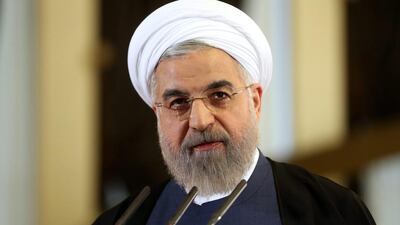The framework for a deal between America and Iran on the nuclear issue is only that: a framework. It is not a definite conclusion. Nevertheless, much of the Arab world is concerned about that framework – and with good reason.
In the short-term, very little positive change is possible in politics. It’s a cruel reality that it is often the bad that happens very quickly and the good takes far longer in comparison.
To take the Iranian example as a case in point: if one agrees that Iran is a problematic state, then it stands to reason that sanctions might be a useful tool to encourage it to change its behaviour for the better. In considering the reasons for Iran to pursue these negotiations to some form of conclusion, attaining relief from the long-term sanctions programme was certainly the top priority.
It ought to be clear that the final deal does not mean that all sanctions will be lifted. There will remain restrictions on Iran that have been put into operation on the basis of its human rights record, support for militant groups, and for its attempt to build a ballistic missile programme.
For the Gulf countries, the Iran question is not solely about the nuclear issue. Iran’s foreign policy continues to promote militant groups and throws its considerable weight behind the Assad regime in Syria. There are concerns around its role in Yemen. It is certainly playing a rather negative hand across the region.
When Arab countries express concerns about the spread of Iranian power: they have a point. It is important not to view those concerns as cantankerous grumblings. These are legitimate concerns, and they must be treated as such. A further problem is that many – if not most – of the alternatives proposed by the naysayers on this framework were hardly plausible either.
The sanctions programme against the Iranians did not bring overnight results – it took time to produce outcomes and to bring Tehran to the negotiating table. Nor is it likely that any policy decision taken in this region is likely to deliver immediate effects.
It might be far more beneficial then to look at this over the medium to long-term. That involves both push and pull, or holding back the negatives while encouraging the positives.
Policy establishments, whether in the US, Europe or elsewhere, need to be able to walk and chew gum at the same time. Unfortunately, in the past four years, there has often been insufficient bandwidth to cope with these types of issues over the long-term, as opposed to reacting to them when they pop up.
To that end, the West ought to consider what sort of alliance it wishes to forge in the region? On the flip side, those in positions of authority in the Arab world should ask the same question: what kind of relationship do they want with the West? Not today, or a year from now, but 10 or 20 years further down the road. When the question is approached in that fashion, it becomes easier to see what is necessary.
In the short-term, Barack Obama has declared he will invite Arab leaders to the US to explain the framework. That seems to send a potentially negative message. The deal affects first and foremost the region in which Iran sits. A discussion is appropriate, and needed – but it should take place in the region itself, or nearby, rather than on American soil.
In the short- to medium-term, the West, led by the US, needs to be rather emphatic that while this framework was a better option than any other alternative on the table, no one should be under any illusion that such a deal will not require enforcement. Additionally, the West ought to be prepared for that, in conjunction with others in the region and internationally.
Moreover, there needs to be a balance between concerns about Iran’s designs on the region, and imagining that Tehran has no plans at all. The “Iranian question” is a real one – but getting the nuance correct is a tricky thing to achieve.
Finally, Iran’s long-term stability relies on recognising the demographic time bomb in its midst and shifting accordingly. This new generation wants a new reality for their country. But that is true not just for Iranians, but also across the Arab world as well.
It may be difficult to consider, given the focus on a security paradigm that currently pervades across the region – but rulers show leadership only when they can, and do, look beyond their immediate horizons. And that horizon is fast approaching, whether one likes it or not.
Dr HA Hellyer is an associate fellow of the Royal United Services Institute in London, and the Centre for Middle East Policy at the Brookings Institution in Washington DC
On Twitter @hahellyer


